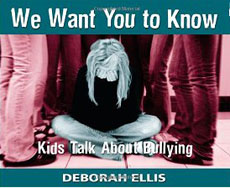There is a bullying epidemic in American schools. Lucinda Franks, writing in The Daily Beast, states that about 250,000 teens a month say they've been physically attacked and, citing a new study by the Cyberbullying Research Center, reveals that about 20 percent of middle-schoolers have said they'd seriously considered suicide, and that people who were bullied at school or online were almost twice as likely to commit suicide.
Deborah Ellis is the internationally known author of more than 20 books for children, a peace activist, and a humanitarian. In this timely and much needed resource, she has gathered first-person accounts by Canadian students between the ages of nine and nineteen to talk about their experiences with bullying. The book is organized into five parts dealing with "You're Not Good Enough," "You're Too Different," "You're It — Just Because," "We Want to Crush You," and "Redemption." At the end of each chapter there are discussion questions, and the closing pages present further resources for children, parents, and teachers.
Bullying, says Ellis in the introduction, is a fact of global existence where victims of war, poverty, AIDS, the illegal drug trade, and people who have served time in prison are picked on. As the Canadian kids show in their personal accounts, many of them have been excluded because someone else or a group concluded that they don't measure up or that they are different and should be ostracized. The children in this book reveal that it is both unfair and wrong-headed to blame the victim of bullying, as is the case with some teachers and parents.
One of the best things about this resource is that it includes accounts by youth who have been bullies. A few of them have moved from being victims to becoming perpetrators in an effort to retain some self-esteem through control. Power is the root of the problem, along with a cruelty that is sometimes mind-boggling in its proportions.
In the section titled "Redemption," Ellis includes essays by youth who have found release from the prisons of fear, shame, and frustration. She concludes: "Respecting others and respecting ourselves leads naturally to respecting the world and all who live in it."
